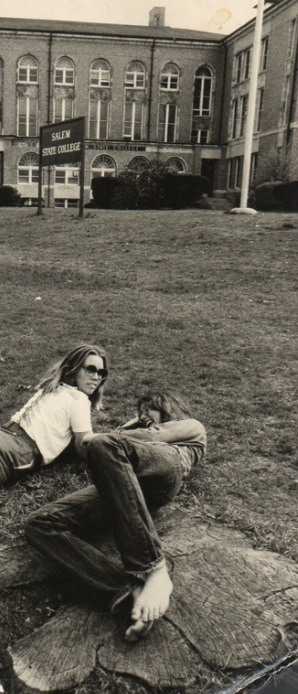Off to College (But Not Really)

With sister Diane (right) on Salem State campus.
When I was seventeen I started at Salem State College, about an hour and a half walk from my parents' house. I majored in English and pursued a double minor in theater and philosophy. My mother hadn't graduated from college, and she thought having a college so close by was a huge asset. My younger sister enrolled there too, and we took some classes together and shared the same set of friends.
Living with my parents while attending college limited me, I think, in both positive and negative ways. On the positive side, I never developed a capacity for alcohol. On the first drink I get really quiet, and on the second one I fall asleep. That may have kept me out of trouble as a young adult. On the negative side, I didn't get the exposure to current music that kids usually share in college dorms, and I didn't develop early in life the easy social manner that comes from living with a lot of others.
After college I lived in Boston and used my English degree as an advertising copywriter and newsletter editor. I wrote book and theater reviews for a local newspaper, and I submitted short stories and a children's book manuscript for publication, with no luck. In my late twenties, not very excited about the job I was working at, I enrolled in graduate school for creative writing at Boston University, even though that meant moving back into my parents' house to save money.
The year at BU cemented my ambition to be a writer—I felt that I had made an investment that I would later have to make good on. I studied fiction writing (particularly the short story) and took lots of literature classes. My group of twelve classmates in my program ranged in age from 22 to 45 and came from or had lived in Israel, Iran, Britain, and Trinidad, as well as Hawaii, Georgia, and Texas. Among the future published authors in the group were Melanie Sumner, who soon published the story collection Polite Society, and Sara Laschever, now a prominent writer and speaker on the subject of women and negotiation (her latest book is called Ask for It!). The director of my program, and my closest advisor, was Leslie Epstein, author of the novel King of the Jews, nephew of the screenwriters of Casablanca, and father of Theo Epstein, who later became general manager of the Boston Red Sox.
I was in the BU library one afternoon reading psychology journals when I came across an article by Robert W. Firestone about people who hear internal voices that erode their self-esteem and incite them to suicide. I thought this phenomenon would be interesting to explore in a novel. The article became one of the germs of inspiration for The Opposite of Music. I continued to make notes for the novel over several years.
Next: Adulthood
Next: Adulthood
